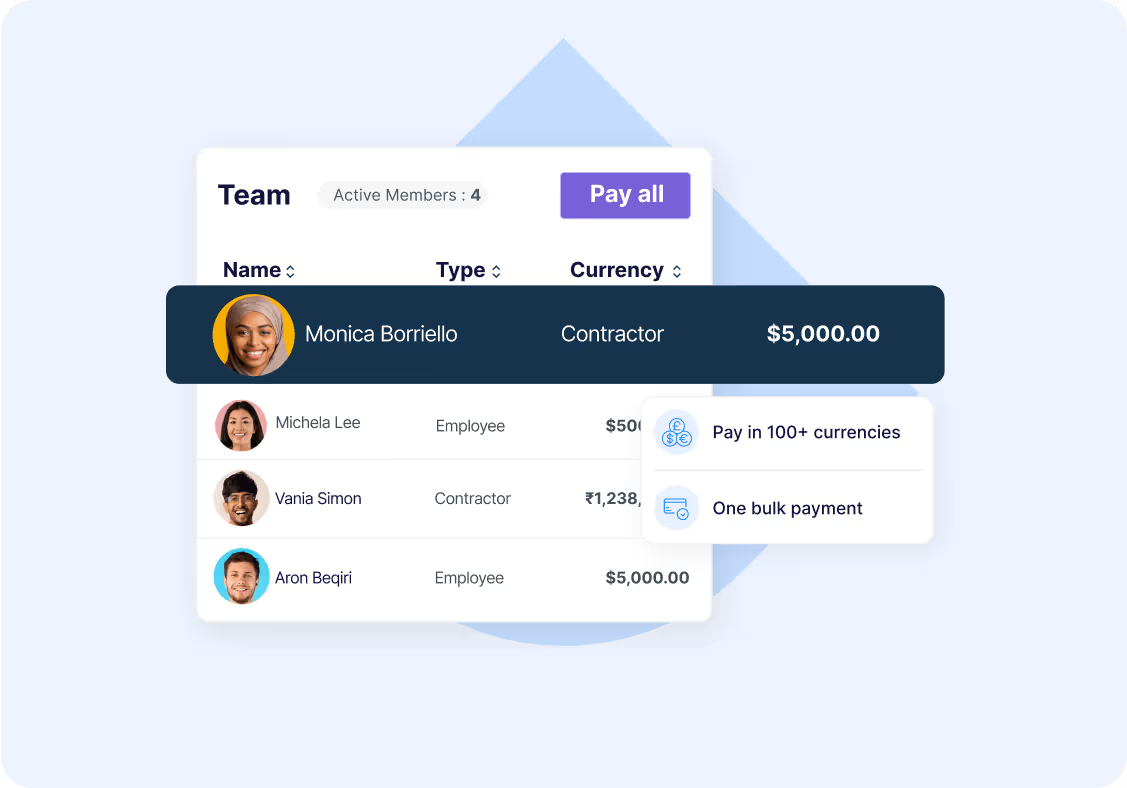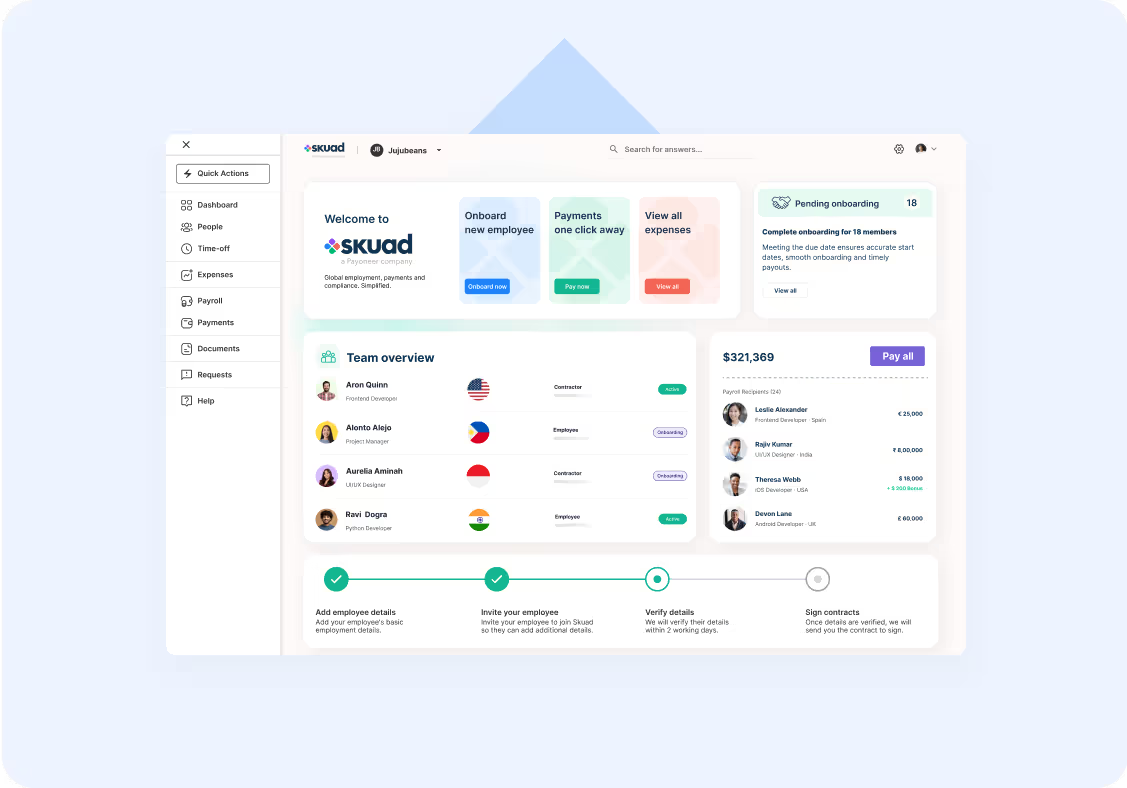Hire & Pay Globally without a local entity
- Instantly onboard new hires anywhere in the world
- Run global payroll securely and with a single click
- Stay 100% compliant with local employment laws
- Manage benefits, work permits, timesheets, and more
Trusted by global leaders across industries

































.svg)
Book a demo

.webp)
Trusted by global leaders across industries

































Stop paying big money to manage your global teams
Is handling payroll in different currencies overwhelming you?
Manage payments in over 100 currencies with Skuad, ensuring your team gets paid on time, every time, in their local currency. We simplify the payment process so you can manage international transactions seamlessly.
.png)
Juggling multiple banking partners for international payroll?
Skuad simplifies this by consolidating all your payroll needs under one roof. With us, you can bypass the hassle of navigating different banking systems in each country, simplifying global payroll.
.png)
Stressed about the accuracy of your payroll transactions?
Skip the spreadsheets and payroll errors. Review salaries of your international hires in one place and pay them with just one click. Skuad guarantees accuracy and reliability in your payroll processing.

Trouble consolidating payroll data for effective decision-making?
Skuad empowers finance teams with streamlined payroll data consolidation, delivering actionable insights for strategic planning, ensuring your organization's fiscal health and success.

Centralized platform for managing global payroll

Compliant contractor payments

Optimized exchange rates

Data protection and security

Multiple payment options


Struggling with the complexity of global payroll laws?

Compliant payroll in 100+ currencies

Guaranteed adherence to local tax laws

Robust data privacy and security

Dedicated payroll compliance experts
Experience the Skuad difference
Transform your global employment journey with customized, efficient, and trustworthy solutions.
$0
Hidden fees - no surprises
160+
Countries covered
100+
Currencies for payroll
24x5
Dedicated support
Global Payroll Guides
See the latest blogs, news and insights about global payments and international employment.

4 innovations in payroll tech for global businesses
Thanks to advanced innovations, it is now easier than ever to manage your payroll systems and deliver them to international teams. If you work with distributed teams, read on to know how this tech is evolving.

Global payroll best practices
By following global payroll best practices, businesses can ensure compliance with regulations, minimize risks and improve payroll efficiency. Read about these best practices in our blog.

10 things you need to know about payroll compliance
One of the most challenging aspects of global payroll is ensuring compliance with local regulations. Countries may have unique tax laws and benefit structures. Learn more about the nuances through our blog.
Frequently asked questions
Is there a global payroll system?
Yes, global payroll systems, like Skuad, exist to help businesses manage and execute payroll for employees in multiple countries through one platform. For instance, Skuad takes care of calculating salaries, tax withholdings, and other deductions while ensuring compliance with each country's specific payroll regulations.
What does global payroll do?
Global payroll manages the process of paying employees in different currencies and countries, considering each location's specific rules and regulations. It handles the complexities of calculating taxes, benefits, and deductions while ensuring that employees get paid accurately and on time.
Why do you need a global payroll provider?
Using a global payroll provider simplifies the complexities of managing payroll in multiple countries. It ensures compliance with each country's legal and tax requirements, automatically handles currency conversions, and manages diverse payroll regulations. This saves time and resources, and reduces the risk of errors and penalties associated with non-compliance.
How do I pay remote workers overseas?
Paying remote workers overseas requires navigating various tax laws, currency conversions, and banking systems. You can use a trusted global payroll provider like Skuad to streamline this process. Skuad offers a unified platform for managing all international payments and ensures that payments are made in the correct currency and comply with local tax regulations, making the process efficient and compliant.
Does Skuad do international payroll?
Yes, Skuad specializes in international payroll services, providing businesses with the capability to manage payroll for employees across over 160 countries. Skuad ensures that all international payments are compliant with local laws, accurately calculated, and processed on time, reducing the administrative burden on businesses.
How can Skuad help with hiring a remote employee internationally?
Skuad helps businesses in hiring remote employees internationally by offering a comprehensive service that includes identifying talent, managing the hiring process, ensuring compliance with local employment laws, and facilitating payments. With Skuad, companies can access a global talent pool and manage the onboarding process efficiently, ensuring that new hires are integrated smoothly into their roles, regardless of their location.
Frequently asked questions
What is the global average PTO?
Paid Time Off (PTO) policies vary widely across countries and companies, making it difficult to provide a global average. However, according to a 2019 study by the International Foundation of Employee Benefit Plans, the average number of PTO days for full-time employees in the United States was 17.1 days per year.
What is the annual leave policy in USA?
The United States does not have a federally mandated annual leave policy for private sector employees. Instead, companies are free to set their own policies and offer vacation time, sick days, and other forms of paid time off as they see fit. The average number of PTO days for full-time employees in the United States was 17.1 days per year.
What country gives the most PTO?
Iran is the most generous country when it comes to paid time off, with 27 holidays and 26 days of paid leave contributing to a total of 53 paid vacation days.
What's the difference between vacation and PTO?
Vacation and PTO (Paid Time Off) are both types of paid leave, but they differ in how they are earned and used. Vacation time is typically earned over time and can only be used for planned time off, while PTO combines vacation, sick leave, and other types of paid leave into a single bank of time that can be used for any purpose.
What is the mandatory leave policy in USA?
The United States does not have a federally mandated mandatory leave policy for private sector employees. However, the Family and Medical Leave Act (FMLA) provides eligible employees with up to 12 weeks of unpaid, job-protected leave for certain family and medical reasons.
What is the difference between vacation and annual leave?
Vacation and annual leave are both types of paid time off, but the main difference is that vacation is typically used for leisure and personal activities, while the annual leave is more flexible and can be used for any purpose, including personal and medical needs.
What is the most common PTO policy?
The most common PTO (paid time off) policy in the US is the accrual method, where employees earn a certain amount of PTO hours for each hour worked, typically ranging from 0.5 to 1.5 hours per week depending on the company's policy. Once accrued, employees can use their PTO hours for vacation, sick leave, or personal time off, subject to their employer's approval.
Skuad is the best solution to hire
and expand globally.
Global employment, payroll, teams and expansion, simplified.
Request demo.svg)
.jpg)
.svg)

.png)

.jpg)
%20(1).jpg)

.jpg)
%20(1).jpg)

%20(1).jpg)
%20(1).jpg)

.jpg)
%20(1).jpg)

.jpg)
%20(1).jpg)








